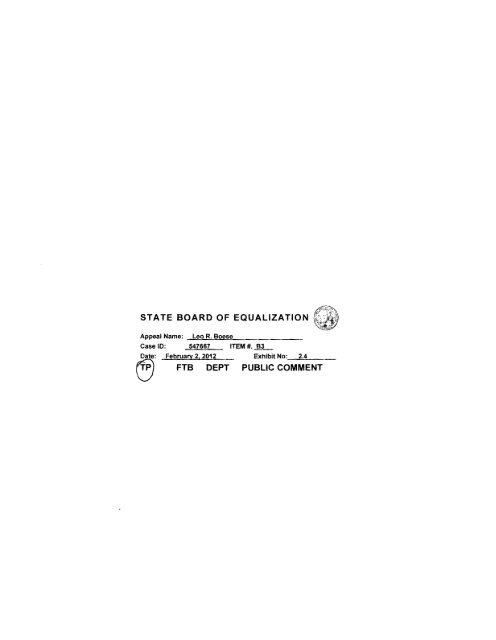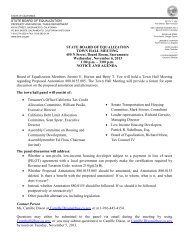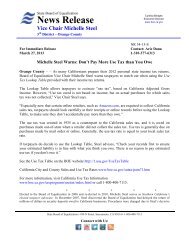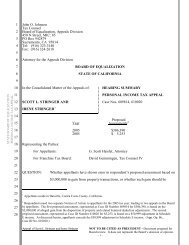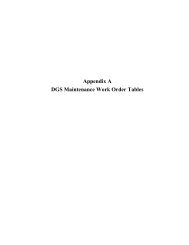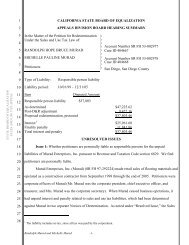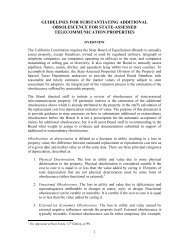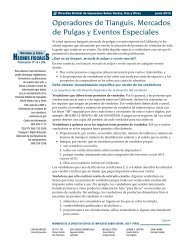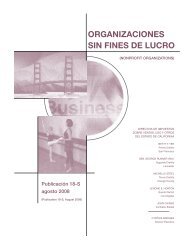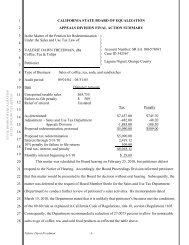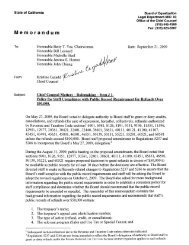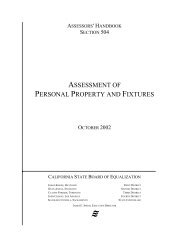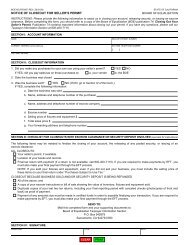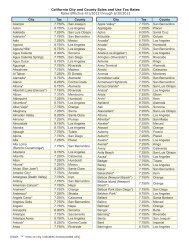B Boese Leo R 547667 TP Exhibits - California State Board of ...
B Boese Leo R 547667 TP Exhibits - California State Board of ...
B Boese Leo R 547667 TP Exhibits - California State Board of ...
- TAGS
- boese
- exhibits
- www.boe.ca.gov
You also want an ePaper? Increase the reach of your titles
YUMPU automatically turns print PDFs into web optimized ePapers that Google loves.
TAXPAYER EXHIBIT<br />
83<br />
February 2, 2012<br />
<strong>Leo</strong> R. 80aese<br />
CONTENTS <strong>547667</strong><br />
TAB 1 <strong>California</strong> Revenue and Taxation Code 18152.5<br />
TAB 2 Incorporation documents, Lebo Automotive<br />
Lebo Automotive Stock Certificate<br />
<strong>California</strong> Certificate <strong>of</strong> Qualification<br />
TAB 3 Lebo Automotive 2000 Corporate Tax Return<br />
Balance Sheet showing $1.7 M Capital Stock + $3.5 M Preferred<br />
Stock<br />
TAB 4 Automotive 2007 Amended Federal 1040X & <strong>California</strong> 540X<br />
TABS KB Parrish letter dated October 28,2009<br />
KB Parrish Response Letter to Denial <strong>of</strong> Amended Claim, dated<br />
May 17, 2010<br />
TAB 6 Kruse Mennillo letter <strong>of</strong> appeal, dated August 25,2010<br />
Kruse Mennillo letter <strong>of</strong> appeal, dated January 4,2011<br />
TAB 7 FTB Examination Letter, dated October 21, 2009<br />
FTB Opening Brief, dated December 2, 2010<br />
FTB Reply Brief, dated March 10,2011
18152.5. (a) For purposes <strong>of</strong> this , gross income shall not<br />
include 50 percent <strong>of</strong> any gain from the sale or exchange <strong>of</strong> qualified<br />
small business stock held for more than five years.<br />
(b) (1) If the taxpayer has eligible gain for the taxable year<br />
from one or more dispositions <strong>of</strong> stock issued by any corporation, the<br />
aggregate amount <strong>of</strong> the gain from dispositions <strong>of</strong> stock issued by<br />
the corporation which may be taken into account under subdivision (a)<br />
for the taxable year shall not exceed the greater <strong>of</strong> either <strong>of</strong> the<br />
following:<br />
(A) Ten million dollars ($10,000,000) reduced by the aggregate<br />
amount <strong>of</strong> eligible gain taken into account by the taxpayer under<br />
subdivision (a) for taxable years and attributable to<br />
di ions <strong>of</strong> stock issued by the corporation.<br />
(8) Ten times the aggregate adjusted bases <strong>of</strong> qualified small<br />
business stock issued by the corporation and disposed <strong>of</strong> by the<br />
taxpayer during the taxable year. For purposes <strong>of</strong> subparagraph (8),<br />
the adjusted basis <strong>of</strong> any stock shall be determined without regard to<br />
any addition to basis after the date on which the stock was<br />
originally issued.<br />
(2) For purposes <strong>of</strong> this subdivision, the term "eligible gain"<br />
means any gain from the sale or exchange <strong>of</strong> qualified small business<br />
stock held for more than five years.<br />
(3) (A) In the case <strong>of</strong> a married individual filing a separate<br />
return, subparagraph (A) <strong>of</strong> paragraph (1) shall be applied by<br />
substituting five million dollars ($5,000,000) for ten million<br />
dollars ($10,000,000).<br />
(B) In the case <strong>of</strong> a married taxpayer filing a joint return, the<br />
amount <strong>of</strong> gain taken into account under subdivision (a) shall be<br />
allocated equally between the spouses for purposes <strong>of</strong> applying this<br />
subdivision to subsequent taxable years.<br />
(e) For purposes <strong>of</strong> this subdivision, marital status shall be<br />
determined under Section 7703 <strong>of</strong> the Internal Revenue Code.<br />
(c) For purposes <strong>of</strong> this section:<br />
(1) Except as otherwise provided in this section, the term<br />
"qualified small business stock" means any stock in a C corporation<br />
which is originally issued after August 10, 1993, if both <strong>of</strong> the<br />
following apply:<br />
(A) As <strong>of</strong> the date <strong>of</strong> issuance, the corporation is a qualified<br />
small business.<br />
(B) Except as provided in subdivisions (f) and (h), the stock is<br />
acquired by the taxpayer at its original issue (directly or through<br />
an underwriter) in either <strong>of</strong> the following manners:<br />
(i) In exchange for money or other property (not including stock).<br />
(ii) As compensation for services provided to the corporation<br />
(other than services performed as an underwriter <strong>of</strong> the stock).<br />
(2) (A) Stock in a corporation shall not be treated as qualified<br />
small business stock unless, during substantially all <strong>of</strong> the taxpayer'<br />
s holding period for the stock, the corporation meets the active<br />
business requirements <strong>of</strong> subdivision (e) and the corporation is a C<br />
corporation.<br />
(8) (i) Notwithstanding subdivision (e), a corporation shall be<br />
treated as meeting the active business requirements <strong>of</strong> subdivision<br />
(e) for any period during which the corporation qualifies as a<br />
specialized small business investment company.
(8) For purposes <strong>of</strong> subparagraph (AI, the term Uparent-subsidiary<br />
controlled group" means any controlled group <strong>of</strong> corporations as<br />
defined in Section 1563 (a) (1) <strong>of</strong> the Internal Revenue Code, except<br />
that both <strong>of</strong> the following shall apply:<br />
(i) "More than 50 percent" shall be substituted for "at least 80<br />
percent" each place it appears in Section 1563(a) (1) <strong>of</strong> the Internal<br />
Revenue Code.<br />
(ii) Section 1563(a) (4) <strong>of</strong> the Internal Revenue Code shall not<br />
apply.<br />
(e) (1) For purposes <strong>of</strong> paragraph (2) <strong>of</strong> subdivision (c), the<br />
requirements <strong>of</strong> this subdivision are met by a corporation for any<br />
period if during that period both <strong>of</strong> the following apply:<br />
(A) At least 80 percent (by value) <strong>of</strong> the assets <strong>of</strong> the<br />
corporation are used by the corporation in the active conduct <strong>of</strong> one<br />
or more qualified trades or businesses in <strong>California</strong>.<br />
(8) The corporation is an eligible corporation.<br />
(2) For purposes <strong>of</strong> paragraph (1), if, in connection with any<br />
future qualified trade or business, a ion is engaged in:<br />
(AI Startup activities described in Section 195(c) (1) (A) <strong>of</strong> the<br />
Internal Revenue Code,<br />
(8) Activities resulting in the payment or incurring <strong>of</strong><br />
expenditures which may be treated as research and experimental<br />
expenditures under Section 174 <strong>of</strong> the Internal Revenue Code, or<br />
(C) Activities with respect to in-house research expenses<br />
described in Section 41(b) (4) <strong>of</strong> the Internal Revenue Code, then<br />
assets used in those activities shall be treated as used in the<br />
active conduct <strong>of</strong> a qualified trade or business. determination<br />
under this paragraph shall be made without regard to whether a<br />
corporation has any gross income from those activities at the time <strong>of</strong><br />
the determination.<br />
(3) For purposes <strong>of</strong> this subdivision, the term "qualified trade or<br />
business" means any trade or business other than any <strong>of</strong> the<br />
following:<br />
(AI Any trade or business involving the performance <strong>of</strong> services in<br />
the fields <strong>of</strong> health, law, engineering, architecture, accounting,<br />
actuarial science, performing arts, consulting, athletics, financial<br />
services, brokerage services, or any trade or business where the<br />
principal asset <strong>of</strong> the trade or business is the reputation or skill<br />
<strong>of</strong> one or more <strong>of</strong> its employees.<br />
(B) Any banking, insurance, financing, leasing, investing, or<br />
similar business.<br />
(C) Any farming business (including the business <strong>of</strong> raising or<br />
harvesting trees).<br />
(D) Any business involving the production or extraction <strong>of</strong><br />
products <strong>of</strong> a character with respect to which a deduction is<br />
allowable under Section 613 or 613A <strong>of</strong> the Internal Revenue Code.<br />
(E) Any business <strong>of</strong> operating a hotel, motel, restaurant, or<br />
similar business.<br />
(4) For purposes <strong>of</strong> this subdivision, the term "eligible<br />
corporation" means any domestic corporation, except that the term<br />
shall not include any <strong>of</strong> the following:<br />
(A) A DISC or former DISC.<br />
(8) A corporation with to which an election under Section<br />
936 <strong>of</strong> the Internal Revenue Code is in effect or which has a direct<br />
or indirect subs with to which the election is in<br />
effect.<br />
(C) A regulated investment company, real estate investment trust
(REIT), or real estate mortgage investment conduit (REMIC).<br />
(0) A cooperative.<br />
(5) (A) For purposes <strong>of</strong> this subdivision, stock and debt in any<br />
subsidiary corporation shall be disregarded and the parent<br />
corporation shall be deemed to own its ratable share <strong>of</strong> the<br />
subsidiary's assets, and to conduct its ratable share <strong>of</strong> the<br />
subsidiary's activities.<br />
(B) A corporation shall be treated as failing to meet the<br />
requirements <strong>of</strong> paragraph (1) for any period during which more than<br />
10 percent <strong>of</strong> the value <strong>of</strong> its assets (in excess <strong>of</strong> liabilities)<br />
consists <strong>of</strong> stock or securities in other corporations which are not<br />
subsidiaries <strong>of</strong> the corporation (other than assets described in<br />
paragraph (6)).<br />
IC) For purposes <strong>of</strong> this paragraph, a corporation shall be<br />
considered a subsidiary if the parent owns more than 50 percent <strong>of</strong><br />
the combined voting power <strong>of</strong> all classes <strong>of</strong> stock entitled to vote,<br />
or more than 50 percent in value <strong>of</strong> all outstanding stock, <strong>of</strong> the<br />
corporation.<br />
(6) For purposes <strong>of</strong> subparagraph (A) <strong>of</strong> paragraph (1), the<br />
following assets shall be treated as used in the active conduct <strong>of</strong> a<br />
qualified trade or business:<br />
(A) Assets that are held as a part <strong>of</strong> the reasonably<br />
working capital needs <strong>of</strong> a qualified trade or business <strong>of</strong> the<br />
corporation.<br />
(8) Assets that are held for investment and are reasonably<br />
to be used within two years to finance research and<br />
experimentation in a qualified trade or business or increases in<br />
working capital needs <strong>of</strong> a qualified trade or business. For periods<br />
after the corporation has been in existence for at least two years,<br />
in no event may more than 50 percent <strong>of</strong> the assets <strong>of</strong> the corporation<br />
qualify as used in the active conduct <strong>of</strong> a qualified trade or<br />
business by reason <strong>of</strong> this paragraph.<br />
(7) A corporation shall not be treated as meeting the requirements<br />
<strong>of</strong> paragraph (1) for any ad during which more than 10 percent <strong>of</strong><br />
the total value <strong>of</strong> its assets consists <strong>of</strong> real property that is not<br />
used in the active conduct <strong>of</strong> a qualified trade or business. For<br />
purposes <strong>of</strong> the preceding sentence, the ownership <strong>of</strong>, dealing in, or<br />
renting <strong>of</strong>, real property shall not be treated as the active conduct<br />
<strong>of</strong> a qualified trade or business.<br />
(8) For purposes <strong>of</strong> paragraph (1), rights to computer s<strong>of</strong>tware<br />
that produces active business computer s<strong>of</strong>tware royalties (within the<br />
meaning <strong>of</strong> Section 543(d) (1) <strong>of</strong> the Internal Revenue Code) shall be<br />
treated as an asset used in the active conduct <strong>of</strong> a trade or<br />
business.<br />
(9) A corporation shall not be treated as meeting the requirements<br />
<strong>of</strong> paragraph (1) for any period during which more than 20 percent <strong>of</strong><br />
the corporation's total payroll expense is attributable to<br />
employment located outside <strong>of</strong> <strong>California</strong>.<br />
(f) If any stock in a corporation is acquired solely through the<br />
conversion <strong>of</strong> other stock in the corporation that is qualified small<br />
business stock in the hands <strong>of</strong> the taxpayer, both <strong>of</strong> the following<br />
shall apply:<br />
(1) The stock so acquired shall be treated as qualified small<br />
business stock in the hands <strong>of</strong> the taxpayer.<br />
(2) The stock so red shall be treated as having been held<br />
during the period during which the converted stock was held.<br />
(g) (1) If any amount included in gross income by reason <strong>of</strong>
holding an interest in a pass-through entity meets the requirements<br />
<strong>of</strong> paragraph (2), then both <strong>of</strong> the following shall apply:<br />
(AJ The amount shall be treated as gain described in subdivision<br />
(a) •<br />
(8) For purposes <strong>of</strong> applying subdivision (b), the amount shall be<br />
treated as gain from a disposition <strong>of</strong> stock in the corporation<br />
issuing the stock disposed <strong>of</strong> by the pass-through entity and the<br />
taxpayer's proportionate share <strong>of</strong> the adjusted basis <strong>of</strong> the<br />
pass-through entity in the stock shall be taken into account.<br />
(2) An amount meets the requirements <strong>of</strong> this paragraph if both <strong>of</strong><br />
the following<br />
(A) The amount is attributable to gain on the sale or exchange by<br />
the pass-through entity <strong>of</strong> stock that is qualified small business<br />
stock in the hands <strong>of</strong> the entity (determined by treating the entity<br />
as an individual) and that was held by that entity for more than five<br />
years.<br />
(8) The amount is includable in the gross income <strong>of</strong> the taxpayer<br />
by reason <strong>of</strong> the holding <strong>of</strong> an interest in the entity that was held<br />
by the taxpayer on the date on which the pass-through entity acquired<br />
the stock and at all times thereafter before the disposition <strong>of</strong> the<br />
stock by the pass-through entity.<br />
(3) Paragraph (1) shall not apply to any amount to the extent the<br />
amount exceeds the amount to which paragraph (1) would have applied<br />
if the amount was determined by reference to the interest the<br />
taxpayer held in the pass-through entity on the date the qualified<br />
small business stock was acquired.<br />
(4) For purposes <strong>of</strong> this subdivision, the term "pass-through<br />
entity" means any <strong>of</strong> the following:<br />
(A) Any partnership.<br />
(8) Any S corporation.<br />
(e) Any regulated investment company.<br />
(D) Any common trust fund.<br />
(h) For purposes <strong>of</strong> this section:<br />
(1) In the case <strong>of</strong> a transfer described in paragraph (2), the<br />
transferee shall be treated as meeting both <strong>of</strong> the following:<br />
(A) Having red the stock in the same manner as the<br />
transferor.<br />
(8) Having held the stock during any continuous period immediately<br />
preceding the transfer during which it was held (or treated as held<br />
under this subdivision) by the transferor.<br />
(2) A transfer is described in this subdivision if the transfer is<br />
any <strong>of</strong> the following:<br />
(A) By gift.<br />
(B) At death.<br />
(C) From a partnership to a partner <strong>of</strong> stock with respect to which<br />
requirements similar to the requirements <strong>of</strong> subdivision (g) are met<br />
at the time <strong>of</strong> the transfer (without regard to the five-year holding<br />
period requirement) .<br />
(3) Rules similar to the rules <strong>of</strong> Section 1244 (d) (2) <strong>of</strong> the<br />
Internal Revenue Code shall apply for purposes <strong>of</strong> this section.<br />
(4) (A) In the case <strong>of</strong> a transaction described in Section 351 <strong>of</strong><br />
the Internal Revenue Code or a reorganization described in Section<br />
368 <strong>of</strong> the Internal Revenue Code, if ified small business stock<br />
is exchanged for other stock that would not qualify as qualified<br />
small business stock but for this subparagraph, the other stock shall<br />
be treated as qualified small business stock acquired on the date on<br />
which the exchanged stock was acquired.
(B) This section shall apply to gain from the sale or exchange <strong>of</strong><br />
stock treated as qualified small business stock by reason <strong>of</strong><br />
subparagraph (AI only to the extent <strong>of</strong> the gain that would have been<br />
recognized at the time <strong>of</strong> the transfer described in subparagraph (A)<br />
if Section 351 or 368 <strong>of</strong> the Internal Revenue Code had not applied at<br />
that time. The sentence shall not apply if the stock that<br />
is treated as qualified small business stock by reason <strong>of</strong><br />
subparagraph (AI is issued by a corporation that (as <strong>of</strong> the time <strong>of</strong><br />
the transfer described in subparagraph (Al) is a qualified small<br />
business.<br />
(Cl For purposes <strong>of</strong> this paragraph, stock treated as qualified<br />
small business stock under subparagraph (AI shall be so treated for<br />
subsequent transactions or reorganizations, except that the<br />
limitation <strong>of</strong> subparagraph (B) shall be applied as <strong>of</strong> the time <strong>of</strong> the<br />
first transfer to which the limitation applied (determined after the<br />
application <strong>of</strong> the second sentence <strong>of</strong> subparagraph (B)).<br />
(D) In the case <strong>of</strong> a transaction described in Section 351 <strong>of</strong> the<br />
Internal Revenue Code, this paragraph shall apply only if immediately<br />
after the transaction the corporation issuing the stock owns<br />
directly or indirectly stock representing control (within the meaning<br />
<strong>of</strong> Section 368(c) <strong>of</strong> the Internal Revenue Code) <strong>of</strong> the corporation<br />
whose stock was exchanged.<br />
(i) For purposes <strong>of</strong> this section:<br />
(1) In the case where the taxpayer transfers y (other than<br />
money or stock) to a corporation in for stock in the<br />
corporation, both <strong>of</strong> the following shall apply:<br />
(A) The stock shall be treated as having been acquired by the<br />
taxpayer on the date <strong>of</strong> the<br />
(B) The basis <strong>of</strong> the stock in the hands <strong>of</strong> the taxpayer shall in<br />
no event be less than the fair market value <strong>of</strong> the y<br />
exchanged.<br />
(2) If the adjusted basis <strong>of</strong> any qualified small business stock is<br />
adjusted by reason <strong>of</strong> any contribution to capital after the date on<br />
which the stock was originally issued, in determining the amount <strong>of</strong><br />
the adjustment by reason <strong>of</strong> the contribution, the basis <strong>of</strong> the<br />
contributed property shall in no event be treated as less than its<br />
fair market value on the date <strong>of</strong> the contribution.<br />
(j) (1) If the taxpayer has an <strong>of</strong>fsetting short position with<br />
respect to any qualified small business stock, subdivision (a) shall<br />
not apply to any gain from the sale or exchange <strong>of</strong> the stock unless<br />
both <strong>of</strong> the following apply:<br />
(A) The stock was held by the taxpayer for more than five years as<br />
<strong>of</strong> the first day on which there was such a short position.<br />
(B) The taxpayer elects to recognize gain as if the stock was sold<br />
on that first day for its fair market value.<br />
(2) For purposes <strong>of</strong> paragraph (1), the taxpayer shall be treated<br />
as having an <strong>of</strong>fsetting short ion with respect to any qualified<br />
small business stock if any <strong>of</strong> the following apply:<br />
(A) The taxpayer has made a short sale <strong>of</strong> substantially identical<br />
property.<br />
IB) The taxpayer has acquired an option to sell substantially<br />
identical property at a fixed<br />
(C) To the extent provided in regulations, the taxpayer has<br />
entered into any other transaction that substantially reduces the<br />
risk <strong>of</strong> loss from holdIng the qualified small business stock. For<br />
purposes <strong>of</strong> the preceding sentence, any reference to the taxpayer<br />
shall be treated as including a reference to any person who is
elated (within the meaning <strong>of</strong> Section 267{b) or 707(b) <strong>of</strong> he<br />
Internal Revenue Code) to the taxpayer.<br />
(k) The Franchise Tax <strong>Board</strong> may prescribe those ions as may<br />
be appropriate to carry out the purposes <strong>of</strong> this section, including<br />
regulations to prevent the avoidance <strong>of</strong> the purposes 0 this section<br />
through splitups, shell , partnerships, or otherwise.<br />
(1) It is the intent <strong>of</strong> slature that, in construing this<br />
section, any regulations that may be promulgated by the Secretary <strong>of</strong><br />
the Treasury under Section 1202(k) <strong>of</strong> the Internal Revenue Code shall<br />
apply to the extent that those regulations do not conflict with this<br />
section or with any ions that may be promulgated by the<br />
Franchise Tax <strong>Board</strong>.
LEO R & BARBARA A. BOESE<br />
ANALYSIS OF CHANGES TO 2006 FEDERAL INCOME TAX RETURN<br />
ADJUSTED GBOSS ItlCOME<br />
NET OPERATING LOSS CARRIED<br />
OVER FROM 2006<br />
SECTION 1202(a) EXCLUSION OF<br />
CAPITAL GAIN FROM THE SALE OF<br />
QUALIFIED SMALL BUSINESS STOCK<br />
ADJUSTED GROSS INCOME<br />
REPORTED ADJUSTMENT ADJUSTED<br />
5,658,638<br />
(67B.108)<br />
(2.658.342)<br />
{3 1 336,45Ot<br />
5,656,638<br />
(678.108)<br />
(2.658.342)<br />
2.322 1 188<br />
ITEMIZED DEDUCTIONS 61,836 61.836<br />
CONTRIBUTIONS CARRIED OVER FROM<br />
THE 2006 RETURN WHEN 2008 NOL<br />
WAS CARRIED BACK TO 2006 30.075 30.075<br />
CHANGE IN ITEMIZED DEDUCTIONS<br />
(LINE 11 OF THE WORKSHEET)<br />
LIMITATION AS FilED<br />
AS AMENDED<br />
70.670<br />
(43,316)<br />
70,670<br />
(43,316)<br />
ITEMIZED DEDUCTIONS 57,429 119.265
October 28,2009<br />
Franchise Tax <strong>Board</strong><br />
Attn: 343:SM:F381<br />
P.O. Box 1673<br />
Sacramento, <strong>California</strong> 95812-1673<br />
To Whom It May Concern:<br />
Re: <strong>Leo</strong> R. & Barbara A. <strong>Boese</strong><br />
Account #:<br />
This letter is in regards to the enclosed letter dated October 21, 2009. The letter has requested<br />
additional infol1nation be provided to substantiate the exclusion <strong>of</strong> gain from the sale <strong>of</strong> qualified<br />
small business stock on the taxpayer's 2007 amended Califomia retum. The requested infonnation<br />
is provided below.<br />
1) Corporation name: Lebo Automotive, Inc.<br />
d/b/a Manhattan Beach Toyota<br />
Corporation number: 2194503<br />
2) Documentation that the corporation met the requirements <strong>of</strong> CR&TC § 18152.5( c)<br />
a) Corporation is a C Corporation see attached item 2a, 2000 Fonn 1120<br />
b) Date <strong>of</strong> original stock issuance was June 20, 2000, the date <strong>of</strong> incorporation. See<br />
attached item 2b, Certificate <strong>of</strong> Incorporation.<br />
c) The taxpayer purchased 17,000 shares <strong>of</strong> stock at its original issuance, referenced<br />
in the Certificate <strong>of</strong> Incorporation. See attached item 2c, taxpayer's stock<br />
certificate.<br />
d) The corporation met the necessary requirements to qualify as a small business at<br />
the date <strong>of</strong> issuance. See attached item 2a, 2000 Fonn 1120 and item 2d<br />
<strong>California</strong> Fonn 100 to confirnl the following:<br />
i) Total gross assets were less than $50 million<br />
ii) The corporation was doing business exclusively in <strong>California</strong><br />
iii) All payroll was attributable to <strong>California</strong><br />
e) All assets owned by the corporation were located in <strong>California</strong> at all times. The<br />
entity only had one location which was in Manhattan Beach <strong>California</strong>. This is<br />
substantiated by the fact that there was no apportionment <strong>of</strong> assets, payroll, or<br />
sales to any state other than <strong>California</strong>.<br />
f) All payroll was attributable to <strong>California</strong>. This is substantiated by the same facts<br />
listed in 2e above.
Franchise Tax <strong>Board</strong> Page 2<br />
3) Documentation that the corporation is a qualified small business.<br />
a) Gross assets <strong>of</strong> the corporation have never been greater than $50 million. See<br />
attached item 2a referenced above.<br />
b) lmmediatc1y after the issuance <strong>of</strong> stock the gross assets did not exceed $50<br />
million. The stock was issued at the inception <strong>of</strong> the corporation; please<br />
reference the initial tax return for the entity, labeled item 2a.<br />
c) All payroll was attributable to <strong>California</strong>. See explanation in 2(f) above.<br />
It is our intentions that this letter and the documentation enclosed will provide sufficient<br />
information so the taxpayer's amended return can continue to be processed as filed. If you have any<br />
further questions regarding this matter, please feel free to contact me. Thank you for your<br />
assistance.<br />
CK:jt<br />
Enclosures<br />
cc: Mr. & Mrs. <strong>Leo</strong> <strong>Boese</strong><br />
Very tnIly yours,<br />
K. B. PARRISH & CO. LLP<br />
Christine S. Keith,CPA
Year Amount at issue<br />
YEARS/AMOUNT OF REFUND CLAIM<br />
2007 $2,658,342 (capital gains to be excluded)<br />
GROUNDS FOR APPEAL<br />
tsoese, J..,t;U 1".<br />
BOE Opening Appellate Brief<br />
August 23, 3010<br />
Page 2 <strong>of</strong>7<br />
Initially, the Taxpayer wishes to provide a brief summary <strong>of</strong> the FTB's position for the<br />
limited purposes <strong>of</strong> ensuring that the FTB' s position is communicated clearly and providing a<br />
structure to the Taxpayer's response. Based on her review <strong>of</strong>Taxpayer's refund claim, the FTB<br />
agent Soni Mangat concluded that the gain from Taxpayer's sale <strong>of</strong>stock in Lebo Automotive<br />
should not be excluded from capital gain under IRe §1202(a) and R&TC §18152.5 because<br />
"Lebo Automotive, Inc., stock does not qualify as 'qualified small business stock' as required by<br />
R&TC § 18152.5." Specifically, Ms. Mangat stated that "the taxpayer purchased the stock from<br />
an existing business and did not acquire the stock at its original issue" as required by R&TC<br />
§18152.5( c)(1 )(B). Secondly, she found that "at the time <strong>of</strong>incorporation, Lebo Automotive,<br />
Inc. was not involved in an active business as the corporation lacked books, records and an<br />
inventory." Furthermore, she believed that "Lebo Automotive, Inc. was incorporated as an<br />
investing company" in direct contravention <strong>of</strong>R&TC §18152.5(e)(3). Based on those three<br />
grounds, Ms. Mangat denied Taxpayer's claim for refund pursuant to R&TC §18152.5.<br />
Contrary to the FTB agent's findings, Taxpayer asserts that the $2,658,342 gain from the<br />
sale <strong>of</strong>his stock in Lebo Automotive, Inc. should be excluded from capital gains because: 1) the<br />
stock was indeed original issue stock, issued in exchange for the assets <strong>of</strong> Manhattan Beach<br />
Toyota; 2) Lebo Automotive, Inc. was actively engaged in a trade or business for "substantially<br />
all" <strong>of</strong>Taxpayer's holding period; and 3) Lebo Automotive, Inc. was not engaged in the activity<br />
<strong>of</strong> investing but rather acquired Manhattan Beach Toyota as an asset purchase for income tax<br />
purposes pursuant to its IRC §338(h)(lO) election. Accordingly, the sale <strong>of</strong> Taxpayer's share in<br />
Lebo Automotive, Inc. stock clearly meets the requirements <strong>of</strong> R&TC §18152.5 and should be<br />
excluded from capital gains.<br />
FACTS<br />
On April 14, 2000, Taxpayer <strong>Leo</strong> <strong>Boese</strong> ("Taxpayer") and AutoNation, Inc.<br />
("AutoNation") entered into a stock purchase agreement wherein Taxpayer acquired from<br />
AutoNation all the outstanding common stock <strong>of</strong> Auto Nation Enterprises (wholly owned<br />
subsidiary <strong>of</strong>AutoNation, Inc. dba Manhattan Beach Toyota) ("Manhattan Beach Toyota") for<br />
$5,814,000. See Amended and Restated Stock Purchase Agreement, Art. 1, Sec. 1.3 on p. 2,<br />
herein attached as Exhibit B. Both Taxpayer and AutoNation agreed to treat the stock purchase<br />
<strong>of</strong> Manhattan Beach Toyota as an asset purchase under IRC §338(h)(1O). See Exhibit S, p. 18,<br />
sec. 5.9(d) <strong>of</strong> Amended and Restated Stock Purchase Agreement; see also 2000 IRS Form 1120,<br />
<strong>State</strong>ment 1, herein attached as Exhibit C. Consequently, the purchase price <strong>of</strong>the Manhattan
<strong>Boese</strong>, <strong>Leo</strong> R.<br />
BOE Opening Appellate Brief<br />
August 23, 3010<br />
Page 4 <strong>of</strong>7<br />
(B) Except as provided in subdivisions (f) and (h), the stock is acquired by the<br />
taxpayer at its original issue (directly or through an underwriter) in either <strong>of</strong><br />
the following manners:<br />
(i) In exchange for money or other property (not including stock).<br />
(ii) As compensation for services provided to the corporation (other than<br />
services performed as an underwriter <strong>of</strong>the stock).<br />
[emphasis added]<br />
Analysis<br />
The subject stock that was sold and produced the gain that should be excluded from<br />
capital gains is that <strong>of</strong> Lebo Automotive, Inc., originally acquired by Taxpayer in 2000.<br />
It is apparent from her letters dated May 24, 2010 that Ms. Mangat erred in finding that<br />
the gain Taxpayer is seeking to exclude is that <strong>of</strong> Manhattan Beach Toyota stock; on the<br />
contrary, the stock at issue is the sale <strong>of</strong> Lebo Automotive, Inc. stock that was issued in<br />
2000 and sold in 2007. As previously stated in Taxpayer's former representative's<br />
correspondence with Ms. Mangat, Lebo Automotive stock was indeed original issue<br />
stock, as Mr. <strong>Boese</strong> paid monetary consideration to purchase the assets <strong>of</strong> Manhattan<br />
Beach Toyota, which then merged into a new dealership under Lebo Automotive, Inc.<br />
The stock that was subseguently issued was that <strong>of</strong> Lebo Automotive, Inc., not Manhattan<br />
Beach Toyota, which no longer existed. See Lebo Automotive, Inc. stock certificate<br />
issued to Mr. <strong>Boese</strong>, attached herein as Exhibit G; see also Stock Purchase Agreement,<br />
Exhibit B.<br />
Ms. Mangat additionally contends that based on the substance over fonn doctrine, the<br />
Lebo Automotive, Inc. stock is not original issue stock because the corporation was<br />
formed "as a conduit to acquire stock <strong>of</strong>an existing business," as opposed to a brand new<br />
business. According to Ms. Mangat, §18152.5 requires that the qualified stock to be that<br />
<strong>of</strong>a brand new corporation, not the result <strong>of</strong>a val id corporate merger. Ms. Mangat's<br />
interpretation <strong>of</strong>the statute is misplaced. No portion <strong>of</strong> the relevant statutes mandates the<br />
qualifying stock to be that <strong>of</strong> a "brand new corporation." The only relevant reguirement<br />
<strong>of</strong> §18152.5(c)(1)(B) is that the original issue stock be acquired either "in exchange for<br />
money or other property" or "as compensation for services provided to the corporation."<br />
There is no mention that the stock must be that <strong>of</strong> a brand new business. Taxpayer here<br />
has s3'tisfied that requirement by paying monetary consideration for the assets <strong>of</strong><br />
Manhattan Beach Toyota, which merged into Lebo Automotive, Inc., the new corporation<br />
that issued the stock at issue. In other words, the stock that was sold and Taxpayer is .<br />
seeking to exclude from capital gains is not Manhattan Beach Toyota stock but a new<br />
original issue stock that belonged to a corporation for which Taxpayer paid good<br />
consideration.<br />
Therefore, it is unequivocal that the subject stock that was sold and should be excluded<br />
from capital gains (i.e., Lebo Automotive, Inc.) satisfies the original issue stock<br />
requirement <strong>of</strong> §18152.5(c)(1)(B).
tsoese, Lt:U 1\..<br />
BOE Opening Appellate Brief<br />
August 23, 3010<br />
Page 5 <strong>of</strong>7<br />
B. Lebo Automotive, Inc. was engaged in an active trade or business for substantially<br />
all <strong>of</strong> Taxpayer's holding period.<br />
Section l8152.5(c)(2)(A) <strong>of</strong>CR&T Code provides,<br />
Stock in a corporation shall not be treated as qualified small business stock unless,<br />
during substantially all <strong>of</strong> the taxpayer's holding period for the stock, the<br />
corporation meets the active business requirements <strong>of</strong> subdivision (e) and the<br />
corporation is a C corporation [emphasis added).<br />
Analysis<br />
Ms. Mangat apparently found that Taxpayer failed to satisfy the above-reference<br />
provision, namely, that Lebo Automotive, Inc. did not engage in active business during<br />
the holding period <strong>of</strong>the subject stock. Specifically, she states, "Since Lebo Automotive,<br />
Inc. was not involved in an active business prior to the purchase <strong>of</strong> Manhattan Beach<br />
Toyota, the Lebo Automotive, Inc. stock does not qualify as 'small business stock, as<br />
required by R&TC §18152.5(c)(2)(A)" [emphasis original). See FTB letter dated May<br />
11, 2010, p. 4, herein attached as Exhibit H.<br />
While Ms. Mangat's statement regarding the fact that Lebo Automotive, Inc. was not<br />
engaged in active business prior to purchasing Manhattan Beach Toyota is accurate, her<br />
interpretation <strong>of</strong>the statutory provision is again misplaced. The language <strong>of</strong> the statute<br />
clearly states that the cO!.:poration whose stock qualifies as small business stock must be<br />
engaged in active business for "substantially all <strong>of</strong>the taxpayer's holding period," not the<br />
entire holding period. The word "substantially" is significant, as the Legislature could<br />
have easily chosen to require that the corporation be in active business mode for 100% <strong>of</strong><br />
the holding period; but the Legislature did not. The logical conclusion is that the<br />
Legislature contemplated a scenario such as this, wherein for a short period <strong>of</strong>time<br />
(during formation or otherwise), a corporation is temporarily inactive in anticipation <strong>of</strong><br />
acquiring another business.<br />
Here, Taxpayer held Lebo Automotive, Inc. stock from June 20, 2000 (its date <strong>of</strong><br />
incorporation) to March 16,2007; Lebo Automotive, Inc. was engaged in an active<br />
automobile dealership from July 19,2000 to March 16,2007. It should be pointed out<br />
that rarely does a regular C-corporation have all the necessary assets, inventory, staff,<br />
books and records to operate on the day <strong>of</strong> inco!.:poration. That is, the date <strong>of</strong><br />
incorporation is generally the date on which the legal entity comes into formation and is<br />
granted status by the Secretary <strong>of</strong><strong>State</strong>. In other words, a typical C-corporation the size<br />
<strong>of</strong> a renowned automobile franchise requires more time than a few hours to fund and<br />
capitalize its business, acquire assets and inventory, and hire sufficient staff to actively<br />
start operating. In the instant case, there was only one month out <strong>of</strong> nearly seven years<br />
that Lebo Automotive, Inc. was not actively engaged in a trade or business, which<br />
amounts to roughly 1 % <strong>of</strong> the holding period. Therefore, a reasonable mind would surely<br />
agree that 99% qualifies as "substantially" all <strong>of</strong>the holding period.
tloese, <strong>Leo</strong> K.<br />
BOE Opening Appellate Brief<br />
August 23, 3010<br />
Page 6 <strong>of</strong>7<br />
Therefore, the FTB's position that Taxpayer did not satisfy the requirement <strong>of</strong>engaging<br />
in active business for "substantially" all <strong>of</strong> the holding period is without merit.<br />
C. Lebo Automotive, Inc. did not merely engage in investment activities but actively<br />
conducted and operated an automobile dealership after the purchase <strong>of</strong> assets<br />
pursuant to its IRe §338{b){lO) election.<br />
CR&T §18152.5(e)(3) provides,<br />
For purposes <strong>of</strong>this subdivision, the term "qualified trade or business" means any<br />
trade or business other than any <strong>of</strong>the following:<br />
(A) Any trade or business involving the performance <strong>of</strong>services in the fields <strong>of</strong><br />
health, law, engineering, architecture, accounting, actuarial science,<br />
performing arts, consulting, athletics, financial services, brokerage services,<br />
or any trade or business where the principal asset <strong>of</strong> the trade or business is<br />
the reputation or skill <strong>of</strong>one or more <strong>of</strong>its employees.<br />
(B) Any banking, insurance, financing, leasing, investing, or similar business.<br />
(C) Any farming business (including the business <strong>of</strong>raising or harvesting trees).<br />
(D) Any business involving the production or extraction <strong>of</strong>products <strong>of</strong>a<br />
character with respect to which a deduction is allowable under Section 613<br />
or 613A <strong>of</strong>the Internal Revenue Code.<br />
(E) Any business <strong>of</strong> operating a hotel, motel, restaurant, or similar business.<br />
Analysis<br />
Ms. Mangat further contends that Taxpayer did not engage in a qualified trade or<br />
business because according to her, "Lebo Automotive, Inc. was incorporated to acquire<br />
the outstanding capital stock <strong>of</strong>Manhattan Beach Toyota... The transaction clearly<br />
reflects that Lebo Automotive, Inc. was incorporated as an investing company which<br />
shortly after its incorporation acquired the outstanding stock <strong>of</strong> Manhattan Beach Toyota<br />
and stirred active participation in a qualified business <strong>of</strong> an auto dealership." See Exhibit<br />
H, p. 4. On this ground, the FTB concluded that Taxpayer did not satisfy the "qualified<br />
trade or business" requirement to exclude the gain from the sale <strong>of</strong>the corporate stock.<br />
Here, Ms. Mangat again ignores the substance over form doctrine in her analysis <strong>of</strong> the<br />
facts. In a true investment scenario, the holding company would purchase only shares <strong>of</strong><br />
the stock, not assets, <strong>of</strong>the company in which it is investing. In addition, a true<br />
investment company would hardly be actively engaged in the daily operation, sales, and<br />
financing <strong>of</strong>an automobile dealership. Nor would the investment company merge its<br />
business into that <strong>of</strong>the company whose shares are being held for investment purposes.<br />
In the instant situation, Mr. <strong>Boese</strong> formed Lebo Automotive, Inc. intentionally and<br />
factually to fully engage and participate in the running <strong>of</strong>an automobile dealership, as<br />
manifested in Lebo's purchase <strong>of</strong> Manhattan Beach Toyota's assets, including inventory,
KM<br />
KRUSE MENNILLO UP<br />
Af:COUNTA!\JTS ANl) [>,.jAf\I;\CEMENT COf'JSl'LTA.NT:'<br />
I7777 CENTER COURT DRIVE, SUITE 550<br />
CFRRITOS, CA 90703<br />
TEl 562403 2560<br />
FAX 562403 2559<br />
\V\'nV.KRUSEfvlENNILLO.COM<br />
VIA FACSIMILE (916.324.3984) AND UNITED STATES POSTAL SERVICE (CERTIFIED MAIL)<br />
January 4, 2011<br />
<strong>Board</strong> Proceedings Division, MIC:81<br />
<strong>State</strong> <strong>Board</strong> <strong>of</strong> Equalization<br />
450 N Street<br />
P.O. Box 942879<br />
Sacramento, CA 94279-0081<br />
Attn: Mr. Anil Bali<br />
RE: Response to Franchise Tax <strong>Board</strong> (Respondent's) Opening Brief dated December 8,<br />
2010<br />
Case ID No.<br />
Taxable year 2007<br />
Dear Sir or Madam:<br />
This formal response brief is hereby filed on behalf <strong>of</strong> the above-named Taxpayer, <strong>Leo</strong> R.<br />
<strong>Boese</strong> ("Taxpayer"), in response to the <strong>California</strong> Franchise Tax <strong>Board</strong> ("FTB") filed opening<br />
brief which was filed on or about December 8, 2010. A copy <strong>of</strong> said brief is attached as Exhibit<br />
A. The Taxpayer respectfully requests that the <strong>Board</strong> <strong>of</strong> Equalization ("BOE") reconsider the<br />
FTB's denial <strong>of</strong> his refund claim for the reasons contained herein. In addition, the Taxpayer also<br />
respectfully requests a hearing before the BOE to discuss the points <strong>of</strong> difference between the<br />
FTB's position and the Taxpayer's position.<br />
To reiterate, the Taxpayer named above DOES NOT agree with the denial <strong>of</strong> his<br />
refund claim issued by the FTB dated on or about May 24,2010. The Taxpayer wishes to<br />
preserve whatever rights granted to them for administrative review <strong>of</strong> the FTB's denial <strong>of</strong> his<br />
refund claim beyond the specific requests <strong>of</strong> this letter. No statement in this letter should be<br />
interpreted as a waiver <strong>of</strong> any rights for administrative review for the above-named Taxpayer.<br />
Additionally, Taxpayer respectfully requests an oral hearing before the <strong>Board</strong> related to the<br />
instant appeal.<br />
TAXPAYER NAME/ADDRESSII.D.<br />
LOS ANGELES • PHOENIX .. KANSAS CITY .. M I A ]\1 I
<strong>Boese</strong>, <strong>Leo</strong> R.<br />
BOE Opening Appellate Brief<br />
August 23, 3010<br />
Page 3 <strong>of</strong>5<br />
clarify certain "Facts" as stated In the "Respondent's Opening Brief' dated on or about<br />
December 3,2010.<br />
First, the facts as outlined by the respondent under fact 3. page 4 attributes to the<br />
representative for Lebo Automotive as stating "[Old] Manhattan Beach Toyota] was merged into<br />
Lebo Automotive, Inc [New Manhattan Beach Toyota] under the Delaware merger statute and<br />
Sec. 368(a) <strong>of</strong> the Internal Revenue Code. This statement is factually incorrect as both Lebo<br />
Automotive and AutoNation both knew that this purchase was to be accounted for as an asset<br />
purchase under Sec 338(h)1O <strong>of</strong> the Internal Revenue Code. Whether stated by the appellant's<br />
representative or not, the statement asserted above is factually incorrect. For evidence <strong>of</strong> this I<br />
refer to:<br />
1. The Stock purchase agreement, page 18 Sec. 5.9(d) provided for the making <strong>of</strong><br />
a Sec. 338(h)(1O) election treating the entire transaction as an asset purchase.<br />
2. The tax year 2000 tax return for Lebo Automotive, Inc. shows a beginning date<br />
<strong>of</strong> July 17, 2000 through December 31, 2000 as its taxable year. This is<br />
consistent with a split <strong>of</strong> the tax year between the old Manhattan Beach Toyota<br />
(with AutoNation picking up the January 1 through July 16, 2000 income on<br />
its consolidated tax return) and the Lebo Automotive, Inc ..<br />
3. The Lebo Automotive, Inc. tax year 2000 tax return statement 1 shows that the<br />
Sec. 338(h)(10) election was properly made on the timely filed tax return.<br />
4. No merger documents were filed with the Lebo Automotive, Inc. 2000 tax<br />
return nor with the Delaware Secretary <strong>of</strong> <strong>State</strong> <strong>of</strong>fice.<br />
The respondent brief further attributes to appellant's representative that **The Lebo Automotive<br />
[New Manhattan Beach Toyota] stock did not exist until Mr. <strong>Boese</strong> exchanged the [Old]<br />
Manhattan Beach [Toyota] stock for it.** Again this statement is simply factually incorrect on<br />
its face. You simply can't exchange what yet hasn't been created. Stock was issued by the<br />
newly formed Lebo Automotive, Inc (Delaware Corporation) to Mr. <strong>Boese</strong> on or about June 20,<br />
2000. The issuance was for 17,000 shares on share certificate No. 1 as original issue. This stock<br />
certificate was never cancelled. Respondent agrees that 17,000 shares <strong>of</strong> stock were issued by<br />
Lebo Automotive in exchange for $1,700,000 from Mr. <strong>Boese</strong>. This was the initial capitalization<br />
<strong>of</strong> Lebo Automotive, Inc.<br />
TAXPAYER'S POSITION<br />
Lebo Automotive, Inc. stock was original stock issued in exchange for the assets <strong>of</strong><br />
Manhattan Beach Toyota.<br />
<strong>California</strong> Revenue & Taxation Code §18152.5 provides, in relevant part,<br />
(a) For purposes <strong>of</strong> this part, gross income shall not include 50 percent <strong>of</strong> any<br />
gain from the sale or exchange <strong>of</strong> qualified small business stock held for more<br />
than five years.<br />
(b) (...]
<strong>Boese</strong>, <strong>Leo</strong> R.<br />
BOE Opening Appellate Brief<br />
August 23,3010<br />
Page 4 <strong>of</strong>5<br />
(2) For purposes <strong>of</strong> this subdivision, the term "eligible gain" means any gain from the<br />
sale or exchange <strong>of</strong> qualified small business stock held for more than five years.<br />
[...]<br />
(c) (1) Except as otherwise provided in this section, the term "qualified small<br />
business stock" means any stock in a C corporation which is originally issued<br />
after August 10, 1993, if both <strong>of</strong> the following apply:<br />
(A) As <strong>of</strong> the date <strong>of</strong> issuance, the corporation is a qualified small business.<br />
(B) Except as provided in subdivisions (f) and (h), the stock is acquired by the<br />
taxpayer at its original issue (directly or through an underwriter) in either <strong>of</strong> the<br />
following manners:<br />
(i) In exchange for money or other property (not including stock).<br />
Oi) As compensation for services provided to the corporation (other than services<br />
performed as an underwriter <strong>of</strong> the stock).<br />
[emphasis added]<br />
Analysis<br />
The subject stock that was sold and produced the gain that should be excluded from capital gains<br />
is that <strong>of</strong> Lebo Automotive, Inc., originally acquired by Taxpayer in 2000. It is apparent from<br />
Respondent's brief dated December 3, 2010, that the only argument Respondent has against the<br />
finding <strong>of</strong> Lebo Automotive qualifying as small business stock is that Mr. <strong>Boese</strong> obtained his<br />
stock in Lebo Automotive (New Manhattan Beach Toyota) in exchange for other stock. As can<br />
be seen from the facts and the exhibits that were presented, the newly formed Lebo Automotive,<br />
Inc originally issued 17,000 shares <strong>of</strong> stock (in fact the only corporate issued shares <strong>of</strong> common<br />
stock throughout the corporation's history) to Mr. <strong>Boese</strong> for $1,700,000 <strong>of</strong> consideration.<br />
The respondent spends considerable time addressing the "supposed merger" <strong>of</strong> the "Old<br />
Manhattan Beach Toyota" with the Lebo Automotive, Inc. ''New Manhattan Beach Toyota". No<br />
where does the respondent show that the two corporations actually merged. Respondent at best<br />
cites the "Amended and Restated Stock Purchase Agreement" as though because it says<br />
"Amended and Restated Stock Purchase Agreement" so it must be so. Yet Respondent does not<br />
respect that the substance <strong>of</strong> the transaction was that <strong>of</strong> an asset purchase as both parties<br />
contemplated in the "Amended and Restated Stock Purchase Agreement" with the ability <strong>of</strong> both<br />
parties to treat the transaction as a Sec. 338(h)(10) transaction. (See page 18 <strong>of</strong> the Amended and<br />
Restated Stock Purchase Agreement)<br />
Respondent fails to grasp the true nature <strong>of</strong> the whole transaction. Mr. <strong>Boese</strong> entered into this<br />
transaction to essentially acquire one asset only. That one asset was the franchise rights to sell<br />
Toyota vehicles. Without this franchise right, Mr. <strong>Boese</strong> could not sell Toyota vehicles or<br />
conduct business as an automotive franchise. Once Lebo Automotive acquired the franchise<br />
rights to sell Toyota's, Lebo Automotive then acquired rights, subject to Toyota's approval, to<br />
expand the store, move the store or subsequently sell those rights.<br />
On page 2 <strong>of</strong> the "Amended and Restated Stock Purchase Agreement" Mr. <strong>Boese</strong> was to pay a<br />
purchase price <strong>of</strong> $5,814,000 for [Old] Manhattan Beach Toyota. This purchase price was then<br />
subsequently placed on the books <strong>of</strong> Lebo Automotive $5,269,716 as an intangible asset for the<br />
Toyota franchise rights. (See Schedule L Balance Sheet <strong>of</strong> the 2000 Lebo Automotive tax return
5<br />
10<br />
15<br />
20<br />
25<br />
2<br />
3<br />
4<br />
6<br />
7<br />
8<br />
9<br />
11<br />
12<br />
13<br />
14<br />
16<br />
17<br />
18<br />
19<br />
21<br />
22<br />
23<br />
24<br />
26<br />
27<br />
28<br />
Second, in order to prevent further evasion <strong>of</strong> the requirement that the stock<br />
issuance generate a new investment for the issuing corporation, the exclusion does not apply to<br />
stock that was previously redeemed by the corporation in certain circumstances. (See Rev. and<br />
Tax. Code section 18152.5(c)(3).)<br />
FACTS<br />
Appellant operated car dealership(s) in the Manhattan Beach, <strong>California</strong> metropolitan<br />
area. In April <strong>of</strong> 2000, appellant entered into a stock purchase agreement to obtain an existing<br />
Manhattan Beach Toyota dealership ("Old Manhattan Beach Toyota") owned and operated by a<br />
subsidiary <strong>of</strong> Auto Nation, Inc. (Auto Nation). (See Appeal letter, Exhibit B, Amended and Restated<br />
Stock Purchase Agreement dated April 14, 2000.) According to Auto Nation's SEC filings, as <strong>of</strong> the<br />
end <strong>of</strong> 2000:<br />
AutoNation, Inc. is the largest automotive retailer in the United <strong>State</strong>s. As <strong>of</strong> December 31,<br />
2000, we owned and operated approximately 400 new vehicle franchises from dealership<br />
locations in major metropolitan markets in 18 states, predominantly in the Sunbelt. ***4<br />
During 2000, we also completed the sale <strong>of</strong> various non-core franchised new vehicle<br />
dealerships for an aggregate sale price <strong>of</strong> approximately $89.7 million. ***<br />
Total revenue was $20.61 billion*** for the year[ ..] ended December 31,2000***<br />
(Exhibit D, Auto Nation's 2000 Form 10K, pages 2 to 4.)<br />
Appellant's purchase <strong>of</strong> the Old Manhattan Beach Toyota stock was the first <strong>of</strong><br />
several steps which culminated in appellant's exchange <strong>of</strong> Old Manhattan Beach Toyota stock for<br />
New Manhattan Beach Toyota stock. The New Manhattan Beach Toyota stock is the stock<br />
appellant's contends is qualified small business stock and for which he is entitled to exclude 50<br />
percent <strong>of</strong> the gain from its subsequent sale. These steps occurred over a total time period <strong>of</strong> thre<br />
months as follows:<br />
1. Step One, Appellant Purchases Old Manhattan Beach Toyota Stock (April 14, 2000):<br />
On April 14,2000, appellant (as an individual) entered into an amended and<br />
restated stock purchase agreement with AutoNation, Inc. {See Appeal Letter, Exhibit B, page 1.)<br />
4 Furthermore, in the stock purchase agreement, appellant acknowledged that "Auto Nation<br />
(together with its affiliates) is the largest automotive retailer in the world...." (See Appeal Letter,<br />
Exhibit B, Article 5, ADDITIONAL AGREEMENTS, 91 5.3.)<br />
3
1<br />
2<br />
3<br />
4<br />
5<br />
6<br />
7<br />
8<br />
9<br />
10<br />
11<br />
12<br />
13<br />
14<br />
15<br />
16<br />
17<br />
18<br />
19<br />
20<br />
21<br />
22<br />
23<br />
24<br />
25<br />
26<br />
27<br />
28<br />
Appellant (as an individual) agreed to purchase all <strong>of</strong> the outstanding stock <strong>of</strong> "Manhattan Beach<br />
Motors, Inc. dba M;;:Inhattan Toyota" or Old Manhattan Beach Toyota. (Jd. at Article 1, 11.2 The<br />
Purchase.) The agreement specifically provided that Auto Nation would sell, assign, transfer and<br />
convey all <strong>of</strong> the stock <strong>of</strong> Old Manhattan Beach Toyota to appellant on the closing date. (ld.)<br />
Furthermore, on the closing date, appellant would pay $5,814,000 for the stock. (Jd. at 11.3<br />
Purchase Price.) The closing date was either the date certain conditions were met or waived, or by<br />
mutual agreement. (ld. at 11.1 The Closing.) Appellant has not established the exact closing date<br />
but it appears to be sometime prior to July 13, 2000.<br />
2. Step 2, Lebo Automotive, dba Manhattan Beach Toyota Incorporates ("New Manhattan<br />
Beach Toyota") (June 20, 2000 and July 13, 2000):<br />
On June 20, 2000, Lebo Automotive, Inc. dba Manhattan Beach Toyota (New<br />
Manhattan Beach Toyota) incorporated in Delaware. (Appeal Letter, Exhibit 0, Delawar:e:Certificate<br />
<strong>of</strong> Incorporation for Lebo Automotive dated June 20, 2000.) On July 13, 2000, Lebo Automotive<br />
(New Manhattan Beach Toyota) qualified to do business in <strong>California</strong>. (Exhibit E.)<br />
3. Step 3, Old Manhattan Beach Toyota Merges Into New Manhattan Beach Toyota and<br />
Appellant Exchanges His Stock in Old Manhattan Beach Toyota Stock for New Manhattan<br />
Beach Toyota Stock (July 17, 2000.) ,<br />
Appellant acquired his Lebo Automotive (New Manhattan Beach Toyota) stock in<br />
exchange for the Old Manhattan Beach Toyota stock as follows. According to appellant's<br />
representative during the audit:<br />
On April 14, 2000, Mr. <strong>Leo</strong> <strong>Boese</strong> (buyer) and AutoNation, Inc. (seller) entered into a stock<br />
purchase agreement for the acquisition <strong>of</strong> all the outstanding common stock <strong>of</strong> [Old<br />
Manhattan Beach Toyota]. ***<br />
Lebo,Automotive, Inc. [New Manhattan Beach Toyota] was incorporated in the <strong>State</strong> <strong>of</strong><br />
Delaware on June 20, 2000. On July 17, 2000, [Old] Manhattan Beach Toyota] was merged<br />
into Lebo Automotive, Inc. [New Manhattan Beach Toyota] under the Delaware merger<br />
statute and §368(a) <strong>of</strong> the Internal Revenue Code. Mr. <strong>Boese</strong> was issued 17,000 shares,<br />
with the par value determined based on the fair market value <strong>of</strong> assets and cash<br />
contributed in the merger. The total value <strong>of</strong> Mr. <strong>Boese</strong>'s stock was $1,700,000. ***<br />
***The Lebo Automotive [New Manhattan Beach Toyota] stock did not exist until Mr. <strong>Boese</strong><br />
exchanged the [Old] Manhattan Beach [Toyota} Stock for it.***<br />
(Exhibit F, Correspondence from Appellant's Representative to Respondent's Auditor dated May 17,<br />
2010, page 1 et seq.)<br />
4
1<br />
2<br />
3<br />
4<br />
5<br />
6<br />
7<br />
8<br />
9<br />
10<br />
11<br />
12<br />
13<br />
14<br />
15<br />
16<br />
17<br />
18<br />
19<br />
20<br />
21<br />
22<br />
23<br />
24<br />
25<br />
26<br />
27<br />
28<br />
As a result, appellant received his stock in New Manhattan Beach Toyota in exchange<br />
for the stock <strong>of</strong> Old Manhattan Beach Toyota. (See also, Appeal Letter, page 2.)<br />
Subsequently, on March 16,2007, appellant sold his New Manhattan Beach Toyota<br />
stock. (See Appeal Letter, Exhibit E, Appellant's 2007 Forms 1040X and 540X.) Appellant<br />
reported gain from the sale in the amount <strong>of</strong> $5,316,683 on his original return. (Id.) On an<br />
amended 2007 Form 540, appellant reported he was entitled to exclude 50 percent <strong>of</strong> that gain or<br />
$2,658,342. (Jd.) Respondent denied appel/ant's claim and this timely appeal followed. (Appeal<br />
Letter, Exhibit A.)<br />
ARGUMENT<br />
THE LEBO AUTOMOTIVE (NEW MANHATTAN BEACH TOYOTA) STOCK CANNOT BE<br />
CONSIDERED QUALIFIED SMALL BUSINESS STOCK BECAUSE APPELLANT OBTAINED HIS<br />
STOCK IN LEBO AUTOMOTIVE (NEW MANHATTAN BEACH TOYOTA) IN EXCHANGE FOR OTHER<br />
STOCK:<br />
Appellant contends he is entitled to exclude 50 percent <strong>of</strong> the gain from his sale <strong>of</strong><br />
Lebo Automotive (New Manhattan Beach Toyota) stock because it was qualified small business<br />
stock. As set forth above, appellant obtained his stock in Lebo Automotive (New Manhattan Beach<br />
Toyota) in exchange forthe stock <strong>of</strong> Old Manhattan Beach Toyota pursuant to a statutory merger,<br />
Le. Internal Revenue Code section 368(a). (Rev. and Tax. Code section 18152.5.)<br />
An Internal Revenue Section 368(a) transaction is a statutory merger or<br />
consolidation. The actual steps <strong>of</strong> a statutory merger or consolidation are as follows:<br />
Under § 368(a)(1)(A), *** one corporation absorbs the corporate enterprise <strong>of</strong> another<br />
corporation, with the result that the acquiring company steps into the shoes <strong>of</strong> the<br />
disappearing corporation as to its assets and liabilities. ***<br />
Example<br />
While an applicable state law plan <strong>of</strong> merger <strong>of</strong> X into Y typically provides that the articles <strong>of</strong><br />
merger will be filed and thereafter the X shareholders will deliver their X shares to V's agent<br />
from which they will receive Y shares in exchange, for tax purposes the transaction is treated<br />
as though X has transferred its property to Y for Y stock and then has dissolved, distributing<br />
the Y stock to its shareholders in exchange for their X stock. ***<br />
(Bittker and Eustice, Federal Income Taxation <strong>of</strong> Corporations and Their Shareholders, 112.22<br />
Statutory Mergers and Consolidations (Type A Reorganization), 112.22[1] In General.}<br />
III<br />
5
2<br />
3<br />
4<br />
5<br />
6<br />
7<br />
8<br />
STATE OF CALIFORNIA<br />
FRANCHISE TAX BOARD<br />
Legal Division<br />
Ann H. Hodges, Tax Counsel IV<br />
P. O. Box 1720<br />
Rancho Cordova, CA 95741-1720<br />
(916) 845-3088<br />
Respondent's Representative<br />
BEFORE THE STATE BOARD OF EQUALIZATION<br />
OF THE STATE OF CALIFORNIA<br />
9<br />
lOin the Matter <strong>of</strong> the Appeal <strong>of</strong>: j Appeal Case JD No. <strong>547667</strong><br />
)<br />
11<br />
)<br />
)<br />
12 LEO R. BOESE )<br />
13<br />
14<br />
15<br />
16<br />
17<br />
18<br />
19<br />
20<br />
21<br />
22<br />
23<br />
24<br />
25<br />
26<br />
27<br />
28<br />
Refund<br />
2007<br />
Amount RECEIVED<br />
$2,658,342<br />
RESPONDENT'S REPLY BRIEF<br />
MAR 1 0 2011<br />
<strong>Board</strong> Proceedings<br />
1 This amount represents the exclusion <strong>of</strong> gain from the sale <strong>of</strong> stock reported by appellant on his<br />
amended return and not the amount <strong>of</strong> tax paid <strong>of</strong> $250,206 for which appellant is requesting a<br />
refund.
2<br />
3<br />
4<br />
5<br />
6<br />
7<br />
8<br />
9<br />
10<br />
11<br />
12<br />
13<br />
14<br />
15<br />
16<br />
17<br />
18<br />
19<br />
20<br />
21<br />
22<br />
23<br />
24<br />
25<br />
26<br />
27<br />
28<br />
INTRODUCTION<br />
Pursuant to the <strong>State</strong> <strong>Board</strong> <strong>of</strong> Equalization's (SBE) correspondence dated<br />
January 7, 2011, respondent hereby responds to appellant's reply brief. Respondent filed its<br />
opening brief on December 3,2010, and incorporates that brief in its entirety herein.<br />
ISSUE<br />
Whether appellant's purchase <strong>of</strong> an auto dealership meets the requirements <strong>of</strong> the<br />
qualified small business stock provisions designed to encourage taxpayers to make investments in<br />
new businesses or a new investment in an existing business?<br />
BACKGROUND<br />
This case involves the qualified stock provisions which allow taxpayers to exclude<br />
50% <strong>of</strong> the gain from the sale <strong>of</strong> "qualified small business stock." (Respondent's Opening Brief<br />
(ROB), 1:12.) The legislative intent and policy behind the qualified small business stock statutes<br />
was primarily to encourage the creation <strong>of</strong> new businesses and also new investment in an existing<br />
business. (Id. at 1:25.) The statutory mechanism for ensuring that these legislative policy goals<br />
were met was to require that a taxpayer must contribute money or other property (not including<br />
stock) to a corporation in exchange for stock, i.e., if the stock is purchased from a shareholder it is<br />
not qualified small business stock. (ld. at 2:10.)<br />
In this appeal, appellant purchased a Toyota Dealership ("Old Manhattan Beach<br />
Toyota" also known as Manhattan Beach Motors) that had been in existence approximately<br />
11 years at the time <strong>of</strong> his purchase. The documents pertinent to the transaction reveal that<br />
appellant consummated the acquisition by purchasing the stock <strong>of</strong> Old Manhattan Beach Toyota<br />
from its shareholder, AutoNation, Inc. Because such an acquisition precludes entitlement to a<br />
qualified small business stock exclusion, appellant attempts to describe a different transaction.<br />
Appellant now claims that he is entitled to a qualified small business stock exclusion because he<br />
formed a "qualified small business" which both obtained the Toyota Dealership and issued the<br />
"qualified small business stock" as opposed to having consummated the direct purchase <strong>of</strong> the<br />
Toyota Dealership stock as previously stated.<br />
III<br />
1
2<br />
3<br />
4<br />
5<br />
6<br />
7<br />
8<br />
9<br />
10<br />
11<br />
12<br />
13<br />
14<br />
15<br />
16<br />
17<br />
] 8<br />
19<br />
20<br />
21<br />
22<br />
23<br />
24<br />
25<br />
26<br />
27<br />
28<br />
Appellant is not entitled to the qualified small business stock exclusion because he<br />
cannot do indirectly that which he cannot do directly. Furthermore, the transaction could only be<br />
treated in the manner in which appellant contends jf certain technical tax requirements are met.<br />
As will be explained in detail below, appellant has not demonstrated that he met these<br />
require ments.<br />
(Reply Brief, page 2.)<br />
FACTS/ARGUMENT<br />
In his reply brief, appellant's representative states that:<br />
The Respondent cites the facts as he understands them and relies on<br />
previous assertions made by the taxpayer's representative. The focus<br />
<strong>of</strong> this response is to outline the facts as they truly happened and not<br />
as they may have been assumed or thought to have happened.<br />
For ease <strong>of</strong> understanding, respondent will set forth the facts <strong>of</strong> the case, and as<br />
relevant, will discuss appel/ant's contentions that respondent has incorrectly stated the facts.<br />
The business that was ultimately sold by appellant and for which he took the<br />
qualified small business stock exclUSion, was a Toyota Dealership located in Manhattan Beach,<br />
<strong>California</strong> that had been in existence approximately 11years when appellant purchased it in 2000.<br />
(Exhibit G, <strong>California</strong> Secretary <strong>of</strong> <strong>State</strong>'s Summary <strong>of</strong> Corporate Filings for Manhattan Beach<br />
Motors, Inc. dba Manhattan Toyota which states it was incorporated in 1989.) Appellant acquired<br />
the Toyota Dealership by purchasing its stock from AutoNation, which was the largest automotive<br />
retailer in the United <strong>State</strong>s. (ROB, 3:10.) AutoNation acquired the Toyota Dealership sometime<br />
after 1989 and prior to 2000. (/d.)<br />
1. Appellant Enters Into Stock Purchase Agreement As an Individual to Purchase Toyota<br />
Dealership ("Old Manhattan Beach Toyota"):<br />
In April <strong>of</strong> 2000, appellant, as an individual, entered into a stock purchase<br />
agreement with AutoNatlon to purchase the stock <strong>of</strong> Old Manhattan Beach Toyota. (Appeal Letter,<br />
Exhibit B, Amended and Restated Stock Purchase Agreement dated April 14, 2000.) Specifically,<br />
the agreement provided:<br />
III<br />
2
2<br />
3<br />
4<br />
5<br />
6<br />
7<br />
8<br />
9<br />
10<br />
1 1<br />
12<br />
13<br />
14<br />
IS<br />
16<br />
17<br />
18<br />
19<br />
20<br />
21<br />
22<br />
23<br />
24<br />
25<br />
26<br />
This AMENDED AND RESTATED STOCK PURCHASE AGREEMENT (this<br />
"Agreement") is effective as <strong>of</strong> April 14, 2000, by and between<br />
(i) AutoNation, Inc., a Delaware corporation rAutoNation"), and<br />
(ii) Mr. <strong>Leo</strong> Bose ("Buyer"). [Emphasis added.]<br />
***<br />
1.2 The Purchase. The acquisition <strong>of</strong> the outstanding capital stock <strong>of</strong><br />
Manhattan Toyota described in this Section is referred to herein as the<br />
"Purchase".....Subject to the terms and conditions <strong>of</strong> this Agreement,<br />
at the Closing AutoNation shall cause its wholly-owned subsidiary,<br />
AutoNation Enterprises Incorporated ("AEI"), to sell, assign, transfer<br />
and convey to Buyer all <strong>of</strong> the outstanding capital stock <strong>of</strong> Manhattan<br />
Toyota, which consists <strong>of</strong> 100 shares <strong>of</strong> common stock, par value<br />
$1,000 per share (the "Shares"). The Shares conveyed hereunder<br />
. shall be free and clear <strong>of</strong> all liens, other than such restrictions as may<br />
be imposed pursuant to state or federal securities laws or such<br />
restrictions as may be imposed by Toyota Motor Sales, U.S.A., Inc. or its<br />
distributor (the "Factory").<br />
1.3 Purchase Price. At Closing, Buyer shall pay to AEI the amount <strong>of</strong><br />
Five Million Eight Hundred Fourteen Thousand Dollars ($5,814,000)<br />
(the "Purchase Price") in consideration <strong>of</strong> the sale, assignment and<br />
transfer <strong>of</strong> the Shares, by wire transfer <strong>of</strong> immediately available funds,<br />
subject to adjustment as set forth in this Agreement.<br />
(Appeal Letter, Exhibit B, page 1, et seq.)<br />
The closing date was either the date certain conditions were met or waived or by<br />
mutual agreement. (fd. at 'fl.l, The Closing.) Appellant has not established the exact closing date<br />
but it appears to be sometime prior to July 13,2000.<br />
2. Appellant Forms New Corporation (Lebo Automotive or "New Manhattan Beach Toyota")<br />
June 20.2000 gnd Juk13. 20i>m;<br />
On June 20,2000, appellant's new corporation, Lebo Automotive, Inc. dba<br />
Manhattan Beach Toyota incorporated in Delaware. (Appeal Letter, Exhibit D, Delaware Certificate<br />
<strong>of</strong> Incorporation for Lebo Automotive dated June 20, 2000.) On July 13,2000, Lebo Automotive<br />
qualified to do business in <strong>California</strong>. (ROB, Exhibit E.)<br />
3. The Toyota Dealership Appellant PLirchased Merges Into His New Company:<br />
In its opening brief, respondent quoted appellant's representative's correspondence<br />
to its auditor which explained how appellant's new corporation (the one for which he is claiming a<br />
27 small business stock exclusion) obtained Old Manhattan Beach Toyota:<br />
28 III<br />
3
2<br />
3<br />
4<br />
5<br />
6<br />
7<br />
8<br />
9<br />
10<br />
11<br />
12<br />
13<br />
14<br />
15<br />
16<br />
17<br />
18<br />
19<br />
20<br />
21<br />
23<br />
24<br />
25<br />
26<br />
27<br />
28<br />
On April 14, 2000, Mr. <strong>Leo</strong> <strong>Boese</strong> (buyer) and AutoNation, Inc. (seller)<br />
entered into a stock purchase agreement for the acquisition <strong>of</strong> all the<br />
outstanding common stock <strong>of</strong> [Old Manhattan Beach Toyota). ***<br />
Lebo Automotive, Inc. [New Manhattan Beach Toyota] was<br />
incorporated in the <strong>State</strong> <strong>of</strong> Delaware on June 20, 2000. On<br />
July 17, 2000, [Old] Manhattan Beach Toyota] was merged into Lebo<br />
Automotive, Inc. [New Manhattan Beach Toyota] under the Delaware<br />
merger statute and §368(a) <strong>of</strong> the Internal Revenue Code. Mr. <strong>Boese</strong><br />
was issued 17,000 shares, with the par value determined based on<br />
the fair market value <strong>of</strong> assets and cash contributed in the merger.<br />
The total value <strong>of</strong> Mr. <strong>Boese</strong>'s stock was $1,700,000. ***<br />
***The Lebo Automotive [New Manhattan Beach Toyota] stock did not<br />
exist until Mr. <strong>Boese</strong> exchanged the [Old] Manhattan Beach [Toyota]<br />
Stock for it.***<br />
(Exhibit F, Correspondence from Appellant's Representative to Respondent's Auditor dated<br />
May 17,2010, page 1, et seq.)<br />
In its reply, appellant contends that respondent has incorrectly stated the facts and<br />
instead <strong>of</strong> appellant purchasing the stock <strong>of</strong> the Toyota Dealership as an individual as previously<br />
represented, appellant now asserts that his newly formed corporation, Lebo Automotive or New<br />
Manhattan Beach Toyota purchased the assets <strong>of</strong> the Toyota Dealership:<br />
III<br />
First, the facts as outlined by the respondent ... attributes to the<br />
representative for Lebo Automotive as stating "[Old] Manhattan Beach<br />
Toyota] was merged into Lebo Automotive, Inc. [New Manhattan Beach<br />
Toyota] under the Delaware merger statute and Sec. 368(a) <strong>of</strong> the<br />
Internal Revenue Code. This statement is factually incorrect as both<br />
Lebo Automotive and AutoNation both knew that this purchase was to<br />
be accounted for as an asset purchase under Sec 338(h)[10P <strong>of</strong> the<br />
Internal Revenue Code. [For evidence <strong>of</strong> the 338(h)(10) election] refer<br />
to:<br />
1. The Stock purchase agreement, page 18 Sec. 5.9{d) provided<br />
for the making <strong>of</strong> a Sec. 338(h)(10) election treating the entire<br />
transaction as an asset purchase.<br />
2. The tax year 2000 tax return for Lebo Automotive, Inc. shows a<br />
beginning date <strong>of</strong> July 17, 2000 through December 31, 2000<br />
as its taxable year. This is consistent with a split <strong>of</strong> the tax year<br />
between old Manhattan Beach Toyota (with Auto Nation picking<br />
up the January 1 through January 16, 2000 income on its<br />
consolidated tax return) and the Lebo Automotive Inc.<br />
2 <strong>California</strong> incorporates Section 338 by reference through Revenue and Taxation Code section<br />
24451.<br />
4
2<br />
3<br />
4<br />
5<br />
6<br />
7<br />
8<br />
9<br />
10<br />
II<br />
12<br />
13<br />
14<br />
15<br />
16<br />
17<br />
18<br />
19<br />
20<br />
21<br />
22<br />
23<br />
24<br />
25<br />
26<br />
27<br />
28<br />
(Appellant's Reply Brief, page 3.)<br />
3. The Lebo Automotive, inc. tax year 2000 tax return statement 1<br />
shows that the Sec. 338(h)(10) election was properly made on<br />
a timely filed tax return.<br />
4. No merger documents were filed with the Lebo Automotive, Inc.<br />
2000 tax return nor with the Delaware Secretary <strong>of</strong> <strong>State</strong> <strong>of</strong>fice.<br />
With respect to the contention that appellant's new corporation was the purchaser in<br />
the acquisition <strong>of</strong> the Toyota Dealership, as set forth above, the stock purchase agreement clearly<br />
identifies the purchaser as <strong>Leo</strong> <strong>Boese</strong>, i.e., as an individual and not a corporation. Appellant's new<br />
corporation, Lebo Automotive ("New Manhattan Beach Toyota") is not referenced anywhere in the<br />
purchase agreement and there are no documents demonstrating when or how it became the<br />
purchaser, or that it actually purchased the shares. Furthermore, Lebo Automotive was<br />
incorporated in June <strong>of</strong> 2000 which was approximately two months afterappellant entered into the<br />
stock purchase agreement in April <strong>of</strong> 2000. Therefore, appellant has not established that his new<br />
corporation, Lebo Automotive, was the purchaser <strong>of</strong> the Toyota Dealership.<br />
Furthermore, appellant is contending that despite the fact that the agreement<br />
provides it was a "stock purchase agreement" a nd that Lebo Automotive's tax return stated it<br />
acquired the stock <strong>of</strong> the Toyota Dealership, by application <strong>of</strong> a section 338(h)(10), the transaction<br />
should be treated as an asset sale. 3 Appellant is correct that if a/l the requirements are properly<br />
met, section 338(h)(10) treats a transaction that is structured as stock purchase as an asset<br />
purchase for tax purposes. 4 In general, the mechanics and effect <strong>of</strong> a 338(h)(10) election are:<br />
3 Section 338 contains provisions for two types <strong>of</strong> elections with respect to transactions that are<br />
structured as stock purchases: 1) an election that is made by the purchaser a/one (338(g») which<br />
does not affect the seller and 2) a joint election made by both the seller and the purchaser<br />
(338(h)(10)).<br />
4 If a section 338 election is not made, the effect <strong>of</strong> the transaction is as follows:<br />
When an acquiring corporation purchases the stock <strong>of</strong> a target corporation [Old<br />
Manhattan Beach Toyota] ...the acquiring corporation's basis for the target's stock ...<br />
is ordinarily the amount paid for the stock, regardless <strong>of</strong> the target's so-called inside<br />
basis (I.e., the basis for the assets), and the assets retain that historical inside basis<br />
even if the target distributes them to the new parent in complete liquidation, unless<br />
the parent elects under § 338 to step-up basis to the amount paid by it for the<br />
target's stock. [footnote omitted]<br />
(Bittker and Eustice, Federal Income Taxation <strong>of</strong> Corporations and Their Shareholders, 110.40<br />
Asset Acquisitions: Allocation <strong>of</strong> Purchase Price in Computing Basis and Related Problems,<br />
110.40[1J In GeneraL)<br />
5
2<br />
3<br />
4<br />
5<br />
6<br />
7<br />
8<br />
9<br />
10<br />
11<br />
12<br />
13<br />
14<br />
15<br />
16<br />
17<br />
18<br />
19<br />
20<br />
21<br />
22<br />
23<br />
24<br />
25<br />
26<br />
28<br />
(d) 338(h)(10) Election. AutoNation hereby agrees and acknowledges<br />
that, at Buyer's option exercisable by written notice to AutoNation no<br />
later than the 15 th day <strong>of</strong> the ninth month following the month in which<br />
the Closing Date occurs, AutoNation shall join Buyer in making a<br />
338(h)(10) election with respect to the transactions contemplated<br />
herein. [Emphasis added.]<br />
(ld. at Section 5.9 Tax Matters, page 18.)<br />
As substantiation that the Buyer made the election, appel/ant does not provide the<br />
written notice or cooperative documents referenced in the stock purchase agreement, but instead<br />
refers to <strong>State</strong>ment 1 on Lebo Automotive, Inc.'s 2000 tax return. Lebo Automotive, Inc.'s 2000 ta<br />
return is unsigned, but dated September <strong>of</strong> 2001. (See Appeal Letter, Exhibit C.) <strong>State</strong>ment 1<br />
reads in relevant part as follows:<br />
On July 17, 2000, Lebo Automotive (PurchaSing Corporation) acquired<br />
100% <strong>of</strong> outstanding shares <strong>of</strong> common stock in Manhattan Beach<br />
Motors, Inc. DBA Manhattan Beach Toyota (EIN 95-4224776).<br />
Manhattan Beach Motors, Inc. was subsequently merged into an<br />
existing Delaware Corporation, Lebo Automotive, Inc. on July 17, 2000.<br />
Lebo Automotive, Inc. (Buyer) and Autonation, Inc. (Seller) have agreed<br />
to IRS Code 338{h)(10) election.<br />
All financial reporting transactions have been reported under EIN<br />
95-4224776 (Manhattan Beach Motors, Inc.). Lebo Automotive, Inc.<br />
received an IRS notification dated January 23,2001 informing Lebo<br />
Automotive, Inc. <strong>of</strong> the assignment <strong>of</strong> EIN 95-4838290. All financial<br />
report(ing) transactions by Lebo Automotive in tax year 2001 will be<br />
submitted under EIN 95-4838290. [In its original form, <strong>State</strong>ment 1<br />
was entirely capitalized; respondent reformatted <strong>State</strong>ment 1 for ease<br />
<strong>of</strong> reading.]<br />
(See Appellant's Appeal Letter, Exhibit C.)<br />
As a threshold matter, elections under section 338 may only be made if the<br />
purchaser is a corporation. However, the stock purchase agreement provides that the buyer was<br />
appellant, <strong>Leo</strong> <strong>Boese</strong>, as an individual. Therefore, appellant has not established how his new<br />
corporation, which did not even exist until several months after the stock purchase agreement was<br />
executed, could be the buyer <strong>of</strong> the Toyota Dealership.<br />
Furthermore, appellant has not established that the 338 (h)( 10) election was either<br />
actually or timely made. The stock purchase agreement provided that at the option <strong>of</strong> the buyer, a<br />
section 338(h)(10) election could be made. By law, the election must be fi led with the Internal<br />
7
2<br />
3<br />
4<br />
5<br />
6<br />
7<br />
8<br />
9<br />
10<br />
11<br />
12<br />
13<br />
14<br />
15<br />
16<br />
17<br />
18<br />
19<br />
20<br />
21<br />
22<br />
23<br />
24<br />
25<br />
26<br />
27<br />
28<br />
Revenue Service by the 15 th day <strong>of</strong> the 9 th month after the acquisition date. The acquisition date <strong>of</strong><br />
the Toyota stock was approximately July <strong>of</strong> 2000 and nine months after that date is April <strong>of</strong> 2001.<br />
The only evidence that the election may have been made is the statement on Lebo<br />
Automotive's federal income tax return for tax year 2000. In addition to the fact that the return is<br />
unsigned, it was dated as <strong>of</strong> September <strong>of</strong> 2001 which is well after the April <strong>of</strong> 2001 due date.<br />
Substantiation that the election was properly and timely made would be at a minimum the written<br />
notice to the Seller and the federal Form 8023, Elections Under Section 338 for Corporations<br />
Making Qualified Stock Purchases. (See e.g., Exhibit H. Internal Revenue Service Form 8023,<br />
Rev. 2-2006.) Neither <strong>of</strong> these documents has been provided.<br />
Finally, the section 338(h)(10) regulations contain a provision to ensure that<br />
taxpayers are not circumventing the requirement that a corporation (rather than an individual)<br />
must be the purchaser <strong>of</strong> a qualified target stock. Specifically, while the regulations state that an<br />
individual cannot make a section 338(h)(10) election, they provide that an individual may form a<br />
new corporation (Le., Lebo Automotive) to purchase the stock <strong>of</strong> the target (Old Manhattan Beach<br />
Toyota). However, the new corporation will not be treated as the purchaser if the new corporation<br />
quickly liquidates, or otherwise disposes <strong>of</strong> the target. Specifically, the regulations provide that:<br />
(b) Rules relating to qualified stock purchases - (1) Purchasing<br />
corporation requirement. An individual cannot make a qualified stock<br />
purchase <strong>of</strong> target. Section 338(d)(3) [26 USCS § 338(d)(3)] requires,<br />
as a condition <strong>of</strong> a qualified stock purchase, that a corporation<br />
purchase the stock <strong>of</strong> target. If an individual forms a corporation<br />
(new P) to acquire target stock, new P can make a qualified stock<br />
purchase <strong>of</strong> target if new P is considered for tax purposes to purchase<br />
the target stock. Facts that may indicate that new P does not purchase<br />
the target stock include new P's merging downstream into target,<br />
liquidating, or otherwise disposing <strong>of</strong> the target stock following the<br />
purported qualified stock purchase.<br />
(Treas. Reg. § 1.338-3(b)(1).)<br />
In this case, the stock purchase took place between April <strong>of</strong> 2000 when the stock<br />
purchase agreement was entered into and the closing date <strong>of</strong> approximately July 18, 2000. Less<br />
than one month later, on August 9,2000, appellant's new corporation requested a Tax Clearance<br />
Certificate for the target, Manhattan Beach Toyota, which certificate was issued October 5, 2000.<br />
(Exhibit I.) The Tax Clearance Certificate indicated that Manhattan Beach Toyota ceased doing<br />
8
2<br />
3<br />
4<br />
5<br />
6<br />
7<br />
8<br />
9<br />
10<br />
11<br />
12<br />
13<br />
14<br />
15<br />
]6<br />
17<br />
18<br />
19<br />
20<br />
2]<br />
22<br />
23<br />
24<br />
25<br />
26<br />
27<br />
2&<br />
business on July 18, 2000. (ld.) In addition, the Secretary <strong>of</strong> <strong>State</strong>'s records indicate that<br />
Manhattan Beach Toyota was merged into Lebo Automotive as <strong>of</strong> October <strong>of</strong> 2000. (Exhibit G.)<br />
These are clearly facts that indicate that Lebo Automotive should not be considered as purchasing<br />
the stock <strong>of</strong> Old Manhattan Beach Toyota for purposes <strong>of</strong> section 338(h)(10).<br />
In effect, the regulations are applying the step transaction doctrine to recast a<br />
transaction in which the individual is the true purchaser <strong>of</strong> the stock. The step transaction doctrine<br />
treats interrelated yet formally distinct steps <strong>of</strong> an integrated transaction as a single transaction<br />
when the steps are interrelated, interdependent, and intended from the outset to reach an ultimate<br />
result. (Commissioner v. Court Holding Co. (1945) 324 U.S. 331, 334; Minnesota Tea Co v.<br />
Helvering (1937) 302 U.S. 609, 613.) As succinctly stated in Commissioner v. Court Holding,<br />
supra, 324 U.S. at p. 334:<br />
The incidence <strong>of</strong> taxation depends upon the substance <strong>of</strong> the<br />
transaction." .., 'To permit the true nature <strong>of</strong> a transaction to be<br />
disguised by mere formalisms, which exists solely to alter tax liabilities<br />
would seriously impair the effective administration <strong>of</strong> the tax policies <strong>of</strong><br />
Congress.<br />
Courts have developed several different tests under the nomenclature "step<br />
transaction" to determine if the steps should be viewed as a whole. Under the "end result" test, a<br />
series <strong>of</strong> transactions will be stepped together whenever the evidence shows that the parties'<br />
intent at the outset was to achieve the particular result, and that the separate steps were all<br />
entered into as means <strong>of</strong> achieving that result. (See Kuper v. Commissioner, (5 th Cir. 1976) 533<br />
F.2d 152; Minnesota Tea Co. v. Helvering, supra, 302 U.S. 609,613.)<br />
Therefore, in accordance with the 338(h)(10) regulations and general principles <strong>of</strong><br />
tax law, viewing the steps as a whole in this transaction, the actual purchaser was appellant<br />
<strong>Leo</strong> <strong>Boese</strong> as an individual. Appellant purchased the Toyota Dealership stock, rather than its<br />
assets. Therefore, appellant has not demonstrated how he met the original acquisition<br />
requirements such that he should be entitled to the exclusion <strong>of</strong> gain. As a policy matter, not<br />
allowing appellant to do indirectly what he eQuid not do directly is consistent with legislative intent<br />
as appellant did not create a new business or make a new investment in an existing business as<br />
contemplated by the statute.<br />
9
Officers<br />
Filing History<br />
CA<br />
90266<br />
Filing Date: 10105/2000<br />
Filing Type: FlUNG<br />
Description: MERGER;OUTGOING-MERGED INTO Q DE; LEBO AUTOMOVIVE, INC.<br />
Filing Date: 10/05/2000<br />
Filing Type: FILING<br />
Ref No: D0630232<br />
Description: MERGER:OUTGOING-MERGED INTO Q DE;LEBO AUTOMOVIVE, INC.<br />
Filing Date: 03/20/1998<br />
Filing Type: FlUNG<br />
Corp No.: C2057471<br />
Description: MERGER;MERGED IN C2057471; RI/MEM MERGER CORP.<br />
Filing Date: 03/20/1998<br />
Filing Type: FILING<br />
Ref No: A0506313<br />
Corp No.: C2057471<br />
Description: MERGER;MERGED IN C2057471 ;RIIMEM MERGER CORP.<br />
Filing Type: FlUNG<br />
Ref No: 0699616<br />
Description: STATEMENT OF OFFICERS<br />
Page 2<br />
Important: The Public Records and commercIally available data sources used on reports have errors. Data is sometimes<br />
entered poorly, processed incorrectly and is generally not free from detect. This system should not be relied upon as<br />
definitjvely accurate. Before relying on any data this system supplies, it should be independently verified. Por Secretary<br />
<strong>of</strong> <strong>State</strong> documents. the fo11olol1ng data is for information purposes only and is not an <strong>of</strong>ficial record. Certitied copies<br />
may be obtained from that individual state's Department <strong>of</strong> <strong>State</strong>.<br />
Your DPPA Permissible Use is: Government Agency<br />
Your GLBA Permissible Use is: Legal Compliance<br />
CopYOghtC> 2011 LexisNexis, 01 division or Reed Elsevier Inc. All rights reserved.
September 19, 2000<br />
KARIS CORPORATE SERVICES<br />
ENTITY ID :<br />
Page 2<br />
Penalty 254.64<br />
Interest 34.00<br />
Balance due $1,088.64<br />
Before a Tax Clearance Certificate may be issued, the corporation must<br />
file return(s) for the periodCs):<br />
From 03/01/98, to 02/28/99.<br />
File the return(s) on the enclosed formes).<br />
When fj1ing the return, take credit for $800.00 in the account.<br />
Please return a copy <strong>of</strong> this letter with your response, using the<br />
enclosed envelope.<br />
Tax Clearance Unit<br />
Special Activities Group<br />
P.O. Box 1468<br />
Sacramento, CA 95812-1468<br />
S KANTNER<br />
GENERAL TAX AUDIT<br />
TELEPHONE (916) 845-6057<br />
EXHIBIT: :I:<br />
PAGE?oF:i<br />
COpy
October 5, 2000<br />
KARIS CORPORATE SERVICES<br />
ENTITY ID :<br />
Page 2<br />
Franchise Tax <strong>Board</strong><br />
Telephone (800) 852-5711<br />
Tax Clearance Unit<br />
Taxpayer Services Center<br />
Telephone (aoo) 852-5711<br />
EXHIBIT: :t.<br />
PAGE.:lDeJ:<br />
COpy


